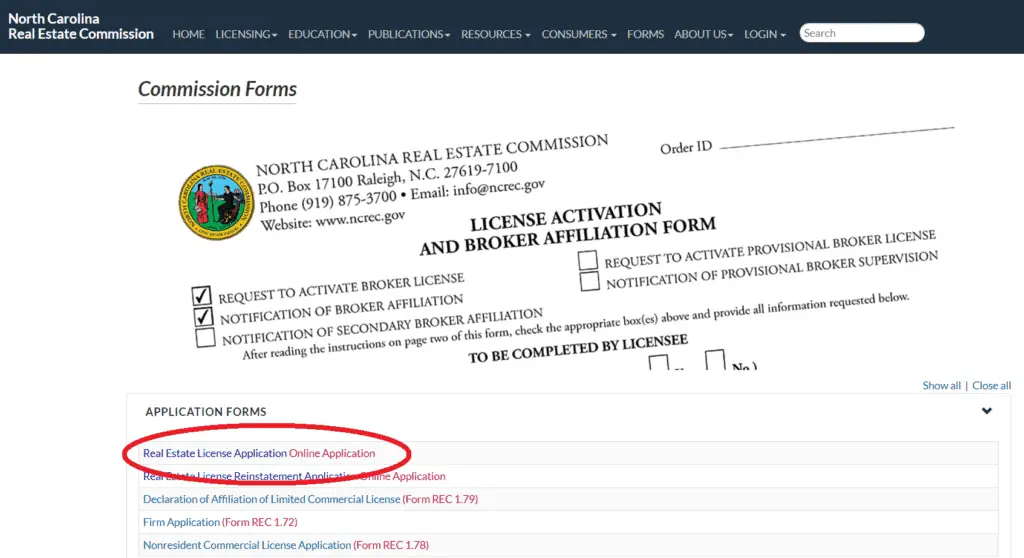(**) Disclosure: This post may contain affiliate links, meaning RealEstateCareerHQ.com will get a commission if you decide to make a purchase through the links, but at no additional cost to you.
As a property manager in North Carolina, your duties may include finding and screening prospective tenants for a property, negotiating the lease terms. You could also be responsible for rent collection, property inspection, maintenance, repair, providing updates, and communicating with the property owner.
To become a property manager in North Carolina, you may obtain a Real Estate Broker-in-Charge (BIC) license from the North Carolina Real Estate Commission. You may also get a real estate broker license and work under the supervision of a licensed broker-in-charge. This requires you to be at least 18 years old, complete 75-hour of pre-license education, pass the real estate broker exam, join a NC brokerage.
You also need to submit an application and a fee of $100 to the North Carolina Real Estate Commission and go through a background check. The North Carolina Real Estate Commission is responsible for issuing real estate licenses and they also have the duty to ensure public interest can be safeguarded.
Note that most states have a real estate salesperson license, but in North Carolina, it is called a “provisional broker.” While the firm/person that hires “provisional broker is called the “broker in charge.”
In this guide, I will focus on the steps on getting the “provisional broker” license, so you may begin your property management by joining a licensed firm. You’ll also find out the income updates and other FAQs about this profession.
But before we start, I want to give a brief disclaimer. This post is not intended as legal advice or state/federal real estate training. It is for general information only. Please always follow your State laws and best practices.
A Table Summary to Become a Property Manager in North Carolina
| Eligibility | Education | Exam | Fees |
|---|---|---|---|
| At least 18 years of age Have a valid Social Security Number Hold a high school diploma or equivalent | 75 hours of pre-license courses 90 hours of post-license courses 8 hours of continuing education every year | 4 hours Required passing score is 100 points. (71/100 for the national portion; 29/40 for the state portion) | Pre-licensing courses $500 approximately Application fee $100 Exam fee $64 |
7 Steps Become a Property Manager in North Carolina

Step 1: Meet the eligibility requirement
- At least 18 years of age
- Have a valid Social Security Number
- Hold a high school diploma or equivalent
Step 2: Complete the pre-licensing education
You need to take 75 hours of pre-license courses from a school approved by the North Carolina Real Estate Commission. You will learn real estate laws, types of interest and ownership in real estate, homeownership, legal descriptions, titles, liens, taxes, property management, property insurance basics, property taxation, real estate contracts, finance, and professional code of ethics.
Step 3: Submit Application to the North Carolina Real Estate Commission
You can apply online through the Commission website.

In addition to the application, you also need to provide.
- $100 fee – You could paid by credit card (i.e.: Visa, Mastercard, American Express) or debt card
- Course Completion Certificate(s)
- Criminal Record Report
- Other necessary documents
Step 4: Pass the North Carolina Real Estate Broker Examination
The next step is to test your knowledge about the real estate field. You need to pass the exam before registering as a real estate broker.
The North Carolina Real Estate Broker Exam consists of two portions, the National Portion and State Portion. You’ll be given 4 hours to complete the test. The required passing score is 100 points. (71/100 for the national portion; 29/40 for the state portion)
Step 5: Work for a Property Management Company

After you pass the exam, you must work with a property management company who holds a BIC license in North Carolina. This is the firm who would sponsor your real estate license.
However, not all brokerage provide property management services to their clients. Most brokerages focus only on the buy-sell side of the business. So make sure you find one that specializes in property management in North Carolina.
At the time that I’m writing this guide, I can see online job postings looking for property managers in North Carolina. The demand is mainly from Raleigh and Charlotte, and some in Greensboro, Asheville, Bennett.
You may search through job forums such as ZipRecruiter, Glassdoor, or LinkedIn.
Step 6: Complete the post-license education

To turn the “provisional” status into an “active” license status, you need to complete 90 hours of post-licensing courses. It will consist of:
- Broker Relationships and Responsibilities – 30 hours
- Contracts and Closing – 30 hours
- License Law, Commission Rules and Legal Concepts – 30 hours
Step 7: Maintain the the NC real estate license
You are required to renew the North Carolina real estate license every year before June 30. It applies even if you just got your license in May or June.
You could renew it online at the NC Real Estate Commission website. The renewal fee is $45. You may pay with VISA, MasterCard, Discover, American Express or even Paypal.
Unlike the post-licensing courses, which is an one-time requirement, you must complete the Continuing Education per annual license period. In North Carolina, all real estate licensees need to complete 8 hours of continuing education classes before June 10th. The curriculum must consist of the
- General Update Course (4 hours)
- Elective course (4 hours)
Here’s a snippet of what a property manager thinks about this career

“I’ve been a property manager for six years, and for three years before that, I was an admin and then an assistant property manager. Being a property manager is an excellent career. The schedules are long days but flexible. If you are a parent, you will be able to attend your kid’s functions as long as you are willing to work late to make up. It’s not a micro-managed industry, so you must have the drive and high standards all on your own, else you won’t last very long. The mistakes are bigger and cost more money than other real estate lines, but the pay is great, and you can create the life balance you need if you work at it.
My advice to someone wanting to get into property management is to learn everything you can as soon as you can. Take advantage of resources and lean on experience people’s knowledge and experience.”
– Nandi Cavil, Commercial Property Manager at Cushman & Wakefield
Here’s another post where you can read more on Nandi’s thoughts about the property management profession. In there, you can find my research and analysis on this career path and valuable insights from other property managers.
FAQ on the property management career in North Carolina
How long does it take to become a property manager in North Carolina?

It takes approximately four months to become a property manager in North Carolina. But it also depends on the time it takes you to complete the pre-licensing course, exam, background check, application, and get sponsorship by a NC Broker-in-Charge.
You may speed up in getting in becoming a property manager by taking online courses. This way, you’ll have the flexibility to finish the pre-licensing education at a quicker pace.
How much does it cost to become a property manager in North Carolina?
It costs approximately $664 to become a property manager in North Carolina. That is the cost to get the real estate broker license and here is the breakdown:
- Pre-licensing courses $500 approximately
- Application fee $100
- Exam fee $64
Can you become a property manager with a felony in North Carolina?
An applicant with a felony may not obtain a real estate license to becoming a property manager if the North Carolina Real Estate Commission determines that the offense is too severe. They would typically be more alarmed on incidents that impact the applicant’s honesty, trustworthiness, character, and integrity.
The Commission will evaluate each case independently. They may also require you to provide further documents and explanation about the incident.
Are there any exceptions to the real estate license requirement to work as property manager in North Carolina?
Yes, there are some limited exceptions – for example, property owners do not need a license to manage their own properties.
Also, there are certain activities where an unlicensed employee may perform. But the unlicensed personnel must be employed by someone with the license.
An unlicensed, salaried employee MAY:
1. Receive and forward phone calls and electronic messages to licensees.
2. Submit listings and changes to a multiple listing service, but only if the listing data or changes are compiled and provided by a licensee.
3. Secure copies of public records from public repositories (i.e., register of deeds office, county tax office,
etc.).4. Place “for sale” or “for rent” signs and lock boxes on property at the direction of a licensee.
5. Order and supervise routine and minor repairs to listed property at the direction of a licensee.
6. Act as a courier to deliver or pick up documents.
7. Provide to prospects basic factual information on listed property that might commonly appear in advertisements in a newspaper, real estate publication or internet website.
8. Schedule appointments for showing property listed for sale or rent.
9. Communicate with licensees, property owners, prospects, inspectors, etc. to coordinate or confirm appointments.
10.Show rental properties managed by the employee’s employing broker to prospective tenants and complete and execute preprinted form leases for the rental of such properties.
11. Type offers, contracts and leases from drafts of preprinted forms completed by a licensee.
12.Record and deposit earnest money deposits, tenant security deposits and other trust monies, and otherwise maintain records of trust account receipts and disbursements, under the close supervision of the office broker-in-charge, who is legally responsible for handling trust funds and maintaining trust accounts.
13. Assist a licensee in assembling documents for closing.
Quote from NCREC – License Law and Rules Comments
14.Compute commission checks for licensees affiliated with a broker or firm and act as bookkeeper for the
firm’s bank operating accounts
How to become a community association manager in North Carolina?
To become a Community Association Manager, you need to obtain a license from the North Carolina Real Estate Commission. You need to complete the required pre-license education and obtain a fidelity bond.
On or after October 1, 2015, it shall be unlawful for any person in this State to act as a community association property manager, directly or indirectly engage in the business of community association property management, hold oneself out to be a community association property manager, or use the title “Licensed Community Association Property Manager” without first obtaining a real estate broker license from the Commission as provided in Article 1 of this Chapter.
GENERAL ASSEMBLY OF NORTH CAROLINA SESSION 2015 House Bill 882- § 93A‑99. License required.
You can read more about the Community Association Property Management Act here.
How Much do Property Manager Make in North Carolina?

Property managers in North Carolina make an average annual income of $96,234. It typically range between $83,540 and $110,711. (*) Your earning as a property manager would depend on your skills, knowledge and experience in managing the properties. The type and number of real estate in your managing portfolio may also affect your compensation.
At the beginning phase of your property management career, you could be working as an assistant for a property manager. So your earning could be limited at that time.
But once you have developed the necessary skillset and demonstrated your ability to work independently, there should be a significant improvement to your earning.
(*) Source: Salary.com Feb 26, 2021
Helpful ideas to build a property management career in North Carolina
Tip#1: Obtain the North Carolina real estate license
Although there are certain activities you may perform without a real estate license, the things you can do are very limited. Once you have a real estate license, you may work under a licensed broker in providing key components of property management. For example, rent, list, negotiate property rental agreement, rents collection.
If you want to move up in the field, getting a real estate license is a “must”.
Tip#2: Network with other real estate professionals

You may consider joining the National Association of Residential Property Managers (NARPM). This allows you to connect with other property managers, thus learn from their valuable experience and share ideas with one another. You will also find updates on the housing markets, changes to the laws and regulations.
Another group you may consider is the NC REALTORS. It consists of mostly real estate professionals. If you plan to run your own property management company, this can be a great referral source for your business.
Tip#3: Start your own property management company

Rather than working for someone else, you may consider getting a Broker-in-Charge (BIC) license and start a property management company.
This allows you to hire other property managers with a real estate license. Thus, lead to a scalable business model.
However, running a company is very different from working as an employed property manager. You need to figure out all the different aspects of the business, such as marketing, branding, prospecting, hiring, training, and accounting.
The expenses will also be a lot higher. In addition to the broker license, you also need to account for business insurance, staff’s salary and benefits, office rent, furniture, office supplies, software, many more.
To obtain a Broker-in-Charge license in North Carolina, you must:
- Be at least 18 years old;
- Have at least 2 years of full time real estate sales experience or 4 years of part-time experience in the past 5 years;
- Complete 12 hours of Broker-in-Charge course from an approved education provider;
- Obtain the Broker-in-Charge Eligible Status
- Complete the CE and license renewal requirement
Here’s a complete guide on how to get a real estate broker license in North Carolina.
Tip #4: Keep up to date with the NC real estate laws and best practices
The NCREC bulletin has many great resources. One of the bulletin articles I read is the “Top Ten Issues for Property Managers.”
It provides helpful ideas on what a property manager should do – for example,
- Have a written property management agreement and operate within the authority granted by the contract.
- Verify the qualifications of a prospective tenant before renting the unit.
- Perform move-in and move-out inspections
- Deposit all monies collected into a trust account before funds disbursement
- Remit rent proceeds to owners promptly.
- Inform owner regarding tenant and financial issues
You may also consider taking the following courses to equip yourself with the property management knowledge. They are offered by Institute of Real Estate Management (IREM). IREM is an affiliate of the National Association of REALTORS®.
- Managing Residential Properties (**)
- Managing Commercial Properties (**)
- Managing Condominium and Homeowners Associations (**)
Even though they are not part of the pre-license education requirement, your enhanced knowledge will help to set you apart from others in the industry.
I have more questions about the real estate license in North Carolina, where can I get help?
You could use the online form to contact the NC Real Estate Commission
(**) Affiliate Disclosure: Please note that some of the links above are affiliate links, and at no additional cost to you. Our company, JCHQ Publishing will earn a commission if you decide to make a purchase after clicking on the link. Please understand that we include them based on our experience or the research on these companies or products, and we recommend them because they are helpful and useful, not because of the small commissions we make if you decide to buy something through the links. Please do not spend any money on these products unless you feel you need them or that they will help you achieve your goals.
Disclaimer: The information in this post is for general information only, and not intend to provide any advice. They are subjected to change without any notice, and not guaranteed to be error-free. For full and exact details, please contact the Ohio Division of Real Estate & Professional Licensing.
Reference:

